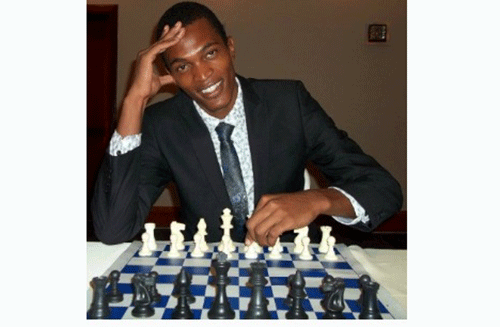Goodwill Khoa
Name: Goodwill T. Khoa
Place of birth: Windhoek, Namibia
Date of birth: 03 September 1989
Former clubs: Ella du Plessis Chess Club,TWCA
Current club: Gunther Husselmann Chess Club
T
hanks for taking the time to chat with us. So, tell us a bit about yourself, and how you got into the sport of chess.
I learned about chess while at Ella du Plessis high school when I was in grade 10. While fixing some computers in the computer lab, I stumbled across a CD with games on them, and to my surprise, chess was on that CD. I tried it out, and used the hint button to give me guidance as to how the pieces move. Our sports teacher Mervin Beukes held chess classes for us weekly, and that also motivated me to learn and improve. Later, I would benefit from the Islandic Chess Development project – ICEDA. The Grand Master then – Hendrick Danielson – asked who wanted to play a game with him, and I volunteered. I obviously lost, but he motivated me to continue as he saw potential in me. And as they say, the rest is history.
And which would you say are some of your biggest achievements in the game to date?
I would say winning both the junior and senior national championship titles, being one of the first three Namibians to get FIDE Arbiter titles, ensuring the first international participation for the world cadet and world juniors, and also being ranked amongst the top three players for multiple years at a national level. Becoming the president of the Namibia Chess Federation is another of my biggest achievements in the sport.
Having recently taken over as president of the Namibia Chess Federation (NCF), what would you say have been some of the challenges?
Upon taking over, we were tasked with so many things that needed to be done. But I’m happy to report that right now, we are trying to secure funding for our financial year as well as for our development and strategic plans. Acquiring a permanent venue to host our events and league matches, and turning chess into a serious profession where players and coaches can start making a living by playing and coaching chess at schools and clubs, are some of our immediate goals. In some areas, we have won.
We have seen some inroads in terms of development, but how do you plan on further broadening the reach of chess at school level?
We are already in all regions through our zonal programmes, and collaboration with the regions’ respective chairpersons. We hope to equip each zone with enough equipment and materials to conduct chess activities within regions and remote towns. We also want to implement chess at schools as a subject to aid with learners’ academic performance. Another plan is to acquire electronic chess sets, and stream quality live chess matches to the broader chess communities.
Administratively, especially since taking over, what have been some of the major barriers that have been hindering you from fully implementing your growth strategy?
As I said earlier, securing sufficient funding for our local events remains a problem, and also ensuring that the venues we use are of a high standard for classical games. We have been approaching some corporates who are keen to come on board. The previous leadership of the federation left the organisation with lots of debt, and we have been working out ways to resolve that situation by settling outstanding bills.
Do you have any strategic partnerships with international chess organisations, especially in areas of development?
The NCF is affiliated to FIDE, which is the World Chess Federation, as well as with the African Chess Confederation. We are also involved with Zone 4.5, which is the SADC body for chess federations. We are now considering partnering with other international bodies in various countries, particularly those which will be willing to invest in Namibian chess. Through those partnerships, we will grow the sport and give our players opportunities.
Talk to us about any upcoming events or tournaments lined up on the federation calendar.
From 17 to 21 March, we will host the Namibia National Senior Chess Championships in Windhoek for both the Closed and B sections. And then a week thereafter, we will have our first Open tournament in various towns, starting with the Karibib Open, which is part of our development programme. On 1 April, we will have the largest event for the NCF, which is our National Junior Chess Championships Open, hosted by the Windhoek Gymnasium school.
Again, thanks a lot for chatting with us…
You are most welcome.



